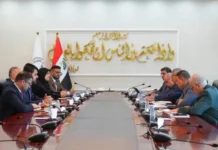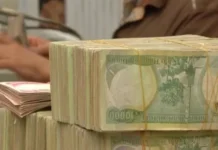
On Saturday, the Minister of Transport, Razzaq Muhaibas Al-Saadawi, met with the Turkish Minister of Transport and Infrastructure, Abdulkadir Oraloglu, and his delegation in Baghdad to discuss the development road project. In a statement released by the ministry’s media office, Al-Saadawi stated that they covered several topics pertaining to the project, including technical, legal and financial matters.
During a meeting attended by high-level officials from both countries, they discussed the economic model of the project and how to establish and operate its various projects. Al-Saadawi confirmed that joint committees have been formed between Baghdad and Ankara to discuss technical, financial, and legal issues. The committees will work to resolve any issues in order to begin implementing the project.
During the meeting, both sides emphasized the importance of conducting field visits to land and railway connection points between their countries. Turkish Minister of Transport and Infrastructure, Mr. Abdulkadir Oraloglu, expressed his condolences and sympathy for the Hamdaniyah incident and reiterated his country’s support for Iraq. He emphasized his government’s readiness to provide any assistance that strengthens the relationship and cooperation between the two countries. Oglu also discussed the increasing volume of trade exchange between Baghdad and Ankara and how transport corridors are expanding globally.
He stated that the “development path” would be the most successful route and highlighted that the Turkish government established a coordination council with several European countries to work on this path. He expressed hope that Iraq and neighboring countries could join the council as well. The development road project, which aims to connect the vital Al-Faw Grand Port on the southern coast of Iraq to Turkey via railway and road networks, is estimated to cost $17 billion. This project intends to make Iraq a transit hub by reducing travel time between Asia and Europe, providing competition for the Suez Canal.
The government of Iraq has plans to introduce high-speed trains for both goods and passengers, with the ability to reach speeds of up to 300 kilometers per hour. Additionally, there are proposals to extend railway lines to nearby industrial and energy centers, such as oil and gas pipelines. The plan involves modernizing and constructing over 1,200 kilometers of railways and highways that will connect the main transportation routes to the primary port of Al-Faw, situated on the shores of the Gulf. This will also link Iraq to neighboring countries.




